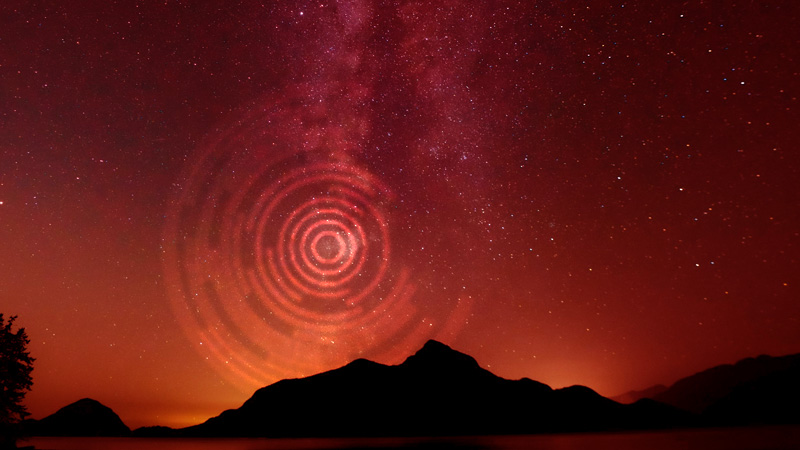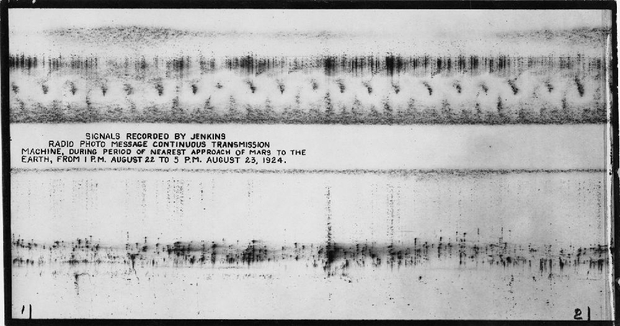In an age where our gadgets allow us to explore the cosmos, we stumbled upon sounds from a future past: an article on historical signals from Mars. The piece, written by [Paul Gilster] of Centauri Dreams, cites a Times essay published by [Becky Ferreira] of August 20. [Ferreira]’s essay sheds light on a fascinating, if peculiar, chapter in the history of the search for extraterrestrial life.
She recounts an event from August 1924 when the U.S. Navy imposed a nationwide radio silence for five minutes each hour to allow observatories to listen for signals from Mars. This initiative aimed to capitalize on the planet’s close alignment with Earth, sparking intrigue and excitement among astronomers and enthusiasts alike.
Amid the technological optimism of the era, a dirigible equipped with radio equipment took to the skies to monitor potential Martian messages. The excitement peaked when a series of dots and dashes captured by the airborne antenna suggested a “crudely drawn face.” Some scientists speculated that this could be a signal from a Martian civilization, igniting a media frenzy. Yet, skeptics, including inventor C. Francis Jenkins, suggested these results were merely a case of radio frequency interference—an early reminder of the challenges we face in discerning genuine signals from the noise of our own planet.
As we tinker with our devices and dream of interstellar communication, the 1924 incident reminds us that the search for extraterrestrial intelligence is a blend of curiosity, creativity, and, often, misinterpretation.

















Oh, come on. The chances of anything coming from Mars are a million to one. I’m convinced there can be no living thing on that remote, forbidding, planet.
But still, they come!
Few men even consider the possibility of life on other planets.
And yet…
You better grab a towel then 😂
You say that in 2024, this was 1924. You only know that because you stand on their curious shoulders
Or they have listened to the original War of the Worlds.
Like Jeff Goldblum said : Life finds a way, I don’t see a good reason to think we are the only ones on the entire Universe/Cosmos/God’s creation or Big Bang thing. If something is alive, it wants to remain alive, and as living creatures we are good surviving, so if circumstaces are fine in any other corner of the cosmos, I mean why not? Of course I’m not an expert, but what if we are actually “contaminating” the outer space with life? were all those artifacts sent to the space 100% free of microorganisms, viruses or similars? dunno , but thinking we are the only fish in the sea doesn’t sound that much rational to me. what do you think ?
Everyone knows million to one chances happen 9 times out of 10.
If this wasn’t true why would so many people buy lottery tickets?
Half of the IQs are below the average.
I think this indicates a possible early detection of Pulsars. As a Pulsar spins, the beam swings past the Earth, and we can detect a pulse of radio waves.
“the 1924 incident reminds us that the search for extraterrestrial intelligence is a blend of curiosity, creativity, and, often, misinterpretation.”
… also wishful thinking, hype for getting ET search funding, and ignoring the increasingly many factors which are required for a planet to become life-hospitable.
Even with 100 billion stars in the Milky Way galaxy, the estimated probable number of life-hospitable planets (other than the ones humans might eventually terraform) will likely turn out to be essentially the experimentally known value of one.
Are you not able to put yourself into the state of mind one might have had in 1924 before any of that was known and even the technology itself was very new? Of course you would excitedly speculate about what we might discover out there. The universe wasn’t fully disenchanted yet. The clouds of Venus were the vapors of dense jungles, the canals on Mars a hint of ancient aqueducts.
Now we know better, but we don’t know it because of your particular attitude. In fact, we know because of theirs.
Speculations about the existence of extraterrestrial life led more to advancements in science fiction movies, radio and TV shows and other entertainment than to advancements in astronomy and knowledge of the planets.
ET devotees have been busy coming up with various workarounds to Fermi’s 1950 question, “Where are they?” asked in response to claims about the existence of such supposed extraterrestrial aliens. Some form of that question had been raised by others earlier.
One in-depth answer to that question was provded by Peter D. Ward and Donald Brownlee in their 2003 book, Rare Earth: Why Complex Life is Uncommon in the Universe.
I try to avoid books that has the conclusion as the title on contentious topics, because it says everything about how they went about writing the book: We believe in this conclusion, so lets prove it.
If it instead was framed as a question and then it explored that question, that’s a book worth reading.
TL;DR: I rather listen to people who asks questions than people who want to shut down discussions or research with their “definite conclusions” based on scant evidence.
Since you indicate you judge a book by its cover, perhaps these books might appear more readable for you:
Of the Plurality of Worlds by William Whenwell (London: Parker & Son, 1853)
The Extraterrestrial Life Debate, 1750-1900 by Michael J. Crowe (Minoola, NY: Dover Publications, 1999)
In one chapter Crowe discusses the polymath Whenwell’s conversion from being a pluralist to developing an anti-pluralist view that led to his 1853 book. Crowe noted: “This task Whewell took up, armed with his geological argument and his nomological and archetypal forms of the design argument. His delight must have been great and his surprise not small as he began to see numerous ways in which the pluralist position could be called into question.
“[T]he magnitude of the challenge Whewell faced deserves particular note. For many decades, pluralism had been taught in classrooms, preached from pulpits, and incorporated into an array of books ranging from astronomy texts to religious tomes. Moreover, his book was nearly without precedent; it was the first sustained critique of pluralism prepared by a man of broad learning and established reputation. In addition, Whewell faced the methodologically complex task of attacking an unfalsifiable hypothesis.”
You must be calculating Flat Planets that can support life…
The Martians were sending a telegram to their lawyer, they were suing H.G. Wells for defamation.
Or maybe it was one of the first transmissions of “We’d like to speak to you about your Model T’s extended warranty.”
I’ve read about this, but often wondered what that actual success of achieving radio silence was… somebody, somewhere…
I can’t imagine there NOT being life in Mars.
First, look at it’s likely warmer, wetter past. If no life developed in that time then why were we so lucky to develop here? And if it did develop long ago, did all that life die out? Maybe. But with all the signs of water underground that seems unlikely to me. Even though… certainly the near-surface is baren.
Or.. say we are wrong about that warmer, wetter past. Say that kind-of-hospitable underground might be a place life could eek out an existence but is not a place it would be likely to begin. So what? We know there is a long history of rocks traveling between that planet and our own and we keep finding extremophiles closer and closer to being able to survive such a journey. Something would have made it.. at least once. And started populating an underground environment that was free and open for population.
Now granted.. none of this has anything to do with the sort of complex life that would build a radio transmitter and beam a signal to Earth. But underground microbes? I think that if we could prove that there are not any that would be far more shocking news than their discovery would be.
Or consider that life started rather quickly on Earth but, if the Theia impact theory of the Moon’s formation is correct maybe life started on Mars first and was transferred to Earth by the rocks traveling between the two? Maybe the Martians we are looking for are us?